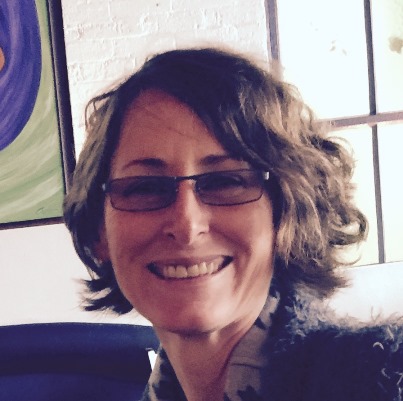The common denominator between lung disorders, climate change, and cancer detection
When we breathe, we expose our bodies to the molecules and particles in the air, and to the extent to which the particles impact our lungs depends on many factors. When these molecules and particles do reach our lungs, the first thing they come into contact with are the many surfaces inside the lung, the lung lining. These interactions, absorption, or penetration, can affect lung health. In addition, chemical exposure and/or mechanical ventilation during surgery can injure the lung lining. It is thus critical to study the breathing process and lung surfactant function in order to develop novel ways to help treat lung disorders, such as asthma, chronic obstructive pulmonary disease (COPD), and lung failures during and after surgical procedures. Prof. Heather C. Allen, Professor of Chemistry and Biochemistry at The Ohio State University, studies the fundamental science of water, ions, and lipids at surfaces, in addition to human tissues from surgery, to reveal the underpinnings of why and how molecules organize. As a physical and analytical chemist with specialization in atmospheric, chemical physics, and biophysics, Dr. Allen’s work thus encompasses not only the biophysics of lung lining, but also a number of other areas involving molecular organization, including atmospheric aerosol, membrane, skin and cancer surfaces. Therefore, Dr. Allen’s research provides a molecular level understanding to facilitate advancements in critical care, climate change research, and cancer detection.
A collective remark shared by Dr. Allen’s students upon entering her lab is, “Everything seems so separate, yet everything is so connected!” In fact, a common denominator that ties Dr. Allen’s many projects together is her expertise in molecular organization at interfaces, using optical linear and nonlinear spectroscopy and microscopy as primary techniques. A recipient of Research Innovation Award from Research Corp. in 2001, an NSF CAREER Award in 2002, and most recently in 2015 an Alexander von Humboldt award from Germany and a Distinguished Scholar Award, Dr. Allen manages a team of chemistry, physics, math, and sometimes environmental and M.D. graduate and undergraduate students, as well as postdoctoral researchers. Providing knowledge and tools for researchers across multiple disciplines, Dr. Allen collaborates with surgeons and anesthesiologists from Ohio State for critical care, climate researchers for collaboration in aerosol and climate change studies, and oncologists for discovering new and better ways to eradicate cancer.
Current research includes:
- Atmospheric Aerosols: Lightning strikes, ocean surfaces, cloud droplets, fogs, and atmospheric particles, or aerosols, and the air we breathe all have water in common. Dr. Allen studies the molecules in aerosols, including bacteria, lipid, and dust particles, to understand the mechanisms behind bubble and aerosol production to aid researchers who are developing global models to predict climate change. Ultimately, Dr. Allen studies the electric fields at surfaces of proxy cloud systems to shed light on some of the most important climate problems. Her work on water was highlighted by Science in 2004 as one of the top ten discoveries.
- Lung Surfactants: To understand how we breathe, and how our lung lining works when it works, and how it fails to work at critical times (e.g. during recovery from heart surgeries), Dr. Allen and her team are studying lung lining mimics and exploring methods and molecules to aid doctors in helping to heal the lung. The lung surface is formed by certain types of molecules (lipids and proteins) produced by cellular processes; the surface itself is an air-lipid-water interface, and deficiencies or inactivation of the lipids at the air-lung interface can lead to clinically significant diseases such as Respiratory Distress Syndrome (RDS) and Acute Respiratory Distress Syndrome (ARDS). Dr. Allen studies the underlying molecular level principles of breathing, and how the molecules interplay with the mechanical process of expansion and contraction of the air sacs, to aid both critical and chronic care doctors in helping patients survive surgery and recover from other lung disorders.
- Cancer Detection: Surgeons do not currently have the necessary technologies to completely resect cancerous tissues, thus leaving to luck the full removal of cancer during surgery. To this end, Dr. Allen and her team develop infrared biomarkers and surgical infrared diagnostics to accurately identify cancerous tissue, and provide the molecular level diagnostics and tools to aid surgeons in real time during surgery. Currently in its beginning stages, this method development research can extend cancer remission, possibly allowing for complete eradication of the disease with much more certainty than is currently possible.
Bio
Dr. Heather Allen received her B.S. degree in Chemistry in 1993 and Ph.D. in Physical Chemistry in 1997 at the University of California, Irvine. One of her advisors, Nobel Laureate Sherwood Rowland, instilled a sense of the importance of understanding all aspects of the world, from climate to the human body. She has continued this frontier of interdisciplinary work. As a student and postdoctoral researcher she was awarded several fellowships including Fannie and John Hertz, EPA, an NSF Traineeship, and a NOAA Post-Doctoral Fellowship in Climate and Global Change. Since being at Ohio State she has been recognized for her research accomplishments with a Research Innovation Award from Research Corp. in 2001, an NSF CAREER Award in 2002, a Beckman Young Investigator Award in 2003, an Alfred P. Sloan Research Fellow Award in 2005, a Camille Dreyfus Teacher-Scholar Award in 2006, and a Fellow of the American Association for the Advancement of Science (AAAS) in 2012, an Alexander von Humboldt Fellow and a Distinguished Scholar Award in 2015. Dr. Allen has also been recognized for several mentoring awards over the years including the most recent in 2013, the American Chemical Society National Award for Encouraging Women into Careers in the Chemical Sciences. She is a Full Professor in the Department of Chemistry and Biochemistry and in the Department of Pathology, and her research specialization is in molecular organization at interfaces with application and significance to atmospheric sciences and lung and cancer investigations.
An interest in atmospheric chemistry, ozone depletion, and air pollution led her to conducting research on liquid surfaces that help us understand why and how atmospheric particles play a role in human health but also in climate change. Since her days as a student, Dr. Allen’s interests have expanded into biophysics and understanding how our lungs, skin, and membranes function. Her most recent interests in cancer detection and improving surgical outcomes stems from a personal story with her family's BRCA gene mutation and losing her sister to ovarian cancer in 2011. As her sister’s first surgery failed to fully remove all of the cancerous tissues and tumors due to a lack of accuracy and precision of available surgical tools, and thus her post surgical outcome was less than optimistic, Dr. Allen hopes to find new ways to facilitate technological advancements in full removal of tumors and cancerous tissues. Likewise, Dr. Allen’s lung surfactant studies were initially motivated by her mother's struggle with advanced-stage COPD, and she tirelessly works to find solutions that will aid in lung recovery, but also in understanding the lung for a basis in holistic medicine.
Outside of research, Dr. Allen enjoys biking and has recently participated in Ohio Pelotonia Cancer Ride for 100 miles. Otherwise, she likes to discover new breakfast places and cafes, is learning the craft of making sourdough bread from scratch, and explores many issues on food and environmental exposures as “our membranes are permeable to everything!”
For more information, visit https://research.chemistry.ohio-state.edu/allen/ and http://chemistry.osu.edu/faculty/allen


